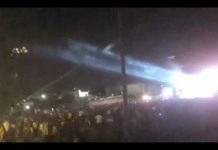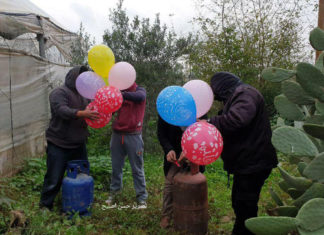As in all past flare-ups, Gaza’s terrorists are out to loosen Israel’s security blockade. But Israel can never consent, as Hamas would then simply import more devastating weaponry.
With hundreds upon hundreds of rockets and mortar shells fired into Israel, and Israeli reprisal strikes on Gaza targeting the Strip’s terrorist leadership with considerable ferocity, these past two days of fighting already constitute the heaviest escalation of conflict in five years. Fearful that it is going to get worse, an estimated 35% of residents of Israel’s Gaza “envelope” towns and villages were reported late Sunday to have temporarily evacuated to safer pastures further north.
To listen to the threats of Hamas and Islamic Jihad, vowing to extend the range of their rockets and missiles to Tel Aviv and the rest of central Israel, and publishing videos highlighting specific potential targets, it might seem inevitable that the violence will escalate further.
With hundreds upon hundreds of rockets and mortar shells fired into Israel, and Israeli reprisal strikes on Gaza targeting the Strip’s terrorist leadership with considerable ferocity, these past two days of fighting already constitute the heaviest escalation of conflict in five years. Fearful that it is going to get worse, an estimated 35% of residents of Israel’s Gaza “envelope” towns and villages were reported late Sunday to have temporarily evacuated to safer pastures further north.
To listen to the threats of Hamas and Islamic Jihad, vowing to extend the range of their rockets and missiles to Tel Aviv and the rest of central Israel, and publishing videos highlighting specific potential targets, it might seem inevitable that the violence will escalate further.
To listen to Israel’s IDF Southern Command chief, Herzl Halevi, it would appear that the army is poised for a far more intensive assault on the Hamas infrastructure. “We are seeking an achievement that will bring a safer, quieter future,” Halevi said late Sunday, noting that the Israel Defense Forces had been “preparing for several months,” including with multiple drills involving ground forces.
And so it might prove. Hamas, the Islamist terror group that makes no secret of its strategic goal of wiping out Israel, and Islamic Jihad, its smaller but no less nasty Iranian-controlled sibling, may indeed yet drag Israel into another full-scale conflict.
As of this writing, however, both sides were indicating that this is something they seek to avoid.
The Sunday night TV news was a surreal mixture of reports compiled earlier on the day’s rocket attacks interspersed with live coverage of yet more alarms and rocket fire
With Israel’s Independence Day celebrations just a few days away, and the Eurovision Song Contest festivities following a week later, the Gaza terror groups are betting that Israel would rather make concessions than plunge into extensive conflict. Hence the calibrated targeting of Israel, rather than an all-out assault.
Israel has already sustained significant blows. The death toll is four at time of writing, including a civilian very deliberately targeted in his car close to the border by a highly accurate anti-tank missile fired from northern Gaza. On Sunday evening, the southern city of Ashdod was hit by a barrage of some 30 rockets — the worst such attack it has ever sustained — with another fatality and considerable devastation. The number of rockets and mortars fired from the Strip has mounted inexorably these past two days — to above 600 at this time of writing. The Sunday night TV news was a surreal mixture of reports compiled earlier on the day’s rocket attacks interspersed with live coverage of yet more alarms and rocket fire. Iron Dome has a reported success rate of some 90%, but that still leaves numerous rockets aimed at residential areas that are getting through the Israeli defenses.
Yet Hamas and Islamic Jihad have further weaponry at their disposal. It was only a few weeks ago that the Gaza terrorists “accidentally” fired rockets at Tel Aviv. Nobody in the Israeli security establishment doubts their ability to do so again, to significant effect. Those precision anti-tank missiles can wreak a great deal more death and destruction. Anonymous sources in the Israeli security establishment were also being quoted on Sunday afternoon, warning of the possibility that violence might engulf northern Israel — as in, Iran might contemplate activating Hezbollah.
For its part, while General Halevi noted that Israel’s military strikes have targeted Hamas ammunition stores, missile launch crews, organizational infrastructure and more, and while Israel on Sunday directly targeted a Hamas operative responsible for channeling Iranian funds to the group, other, still more sensitive Hamas targets have not yet been struck. Many key members of the Hamas and Islamic Jihad leadership are in Cairo, where Egypt is trying to mediate some kind of ceasefire process. Many, but not all. Likewise, there has been no serious talk to date about an IDF ground offensive.
At a lengthy meeting of the security cabinet on Sunday, Israel’s key ministers reportedly discussed the proximity of Independence Day, but nonetheless told the IDF to continue its operations with the only imperative being to ensure “the security of the state and its citizens.” Yet the upcoming anniversaries — IDF Memorial Day and Independence Day — are significant; the government would prefer not to mark them in mid-conflict.
Similarly, the notion that an imminent televised song competition would impact on Israel’s military strategizing may seem absurd, but mid-May’s Eurovision Song Contest is widely described as the world’s biggest annual music festival. Hundreds of millions of people are expected to watch it, and by extension to watch Israel. A forced cancellation — for the first time in the contest’s 63-year history — would not merely be embarrassing for Israel. It would impact Israel’s international reputation and status, with significant economic implications long into the future, including but not limited to tourism.
This round of violence ostensibly began with an Islamic Jihad sniper injuring two Israeli soldiers at the Gaza border on Friday, and the deaths of two Islamic Jihad terrorists in Israel’s retaliation. From there, overnight Friday, we entered the bitterly familiar routine of rocket and mortar attacks on southern Israel, IDF responses, wider rocket fire, heavier IDF responses, and so on.
But to view this conflict from that narrow perspective is erroneous. The root of this round of violence, as of those that have preceded it in the 12 years since Hamas violently seized control of Gaza from Palestinian Authority President Mahmoud Abbas’s Fatah faction, is that Hamas, Islamic Jihad and their sponsors have no tolerance for the presence of the Jewish state.
Israel left Gaza in 2005, forcibly evicting 7,000-8,000 Israeli Jews from some 20 settlements, moving out the entire military, and withdrawing to the pre-1967 lines. In other words, Israel has no presence in Gaza, no quarrel with Gaza, and would like nothing more than to see Gaza thrive.
But Hamas has other ideas. Thus while Gaza’s citizens suffer in poverty, it subverts any and all potential resources to its terror machine. It sends Gazans to the border in endless riots under the banner of a “return” to today’s Israel. And the “concessions” that it seeks to leverage from Israel, in this and all previous rounds of violence and full-scale conflict, are the same: to loosen Israel’s security grip on Gaza in order to bring in the money and the weaponry to cause greater and greater harm to Israel down the line.
Does this mean that Israel will inevitably have to reconquer the Gaza Strip (with the danger of considerable loss of life), oust Hamas’s military forces, and try to marginalize its extremist ideology? Well, for there to be an end to these relentless rounds of conflict, somebody is going to have to supplant the Islamic extremists. The problem Israel faces is that it does not wish to retake control and responsibility for Gaza, and its 2 million or so Palestinians, but sees nobody else prepared to do so.
And that will remain the reality however this current round of violence plays out, however high the toll of death and widespread the trauma and devastation. Hence Israel’s talk of reasserting its deterrent capability, and restoring calm, rather than strategic change.








